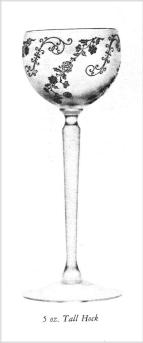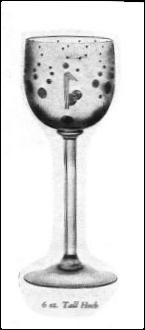To Hock or To Hoch? That is the Question
by Georgia G. Otten
Issue 308 - December 1998
Studying Cambridge stems is very interesting and one thing seems to lead to another. Once again I found myself in the "look it up and find out" mode. I wanted to know why there were two spellings: hock and hoch. It may not be important at all, but it is a curiosity and I was just wondering. (Does this sort of thing ever happen to anyone else?)

 I began checking the descriptions under
the stems in the 1930-34 catalog and found both of the spellings. In
Mark Nye's stem book, I found both spellings. There is one entry in the
colors book and it used the hoch. I did not find hock or hoch in the
1927-29 catalog. The 40s catalog reprint showed two stems, both with
the hock spelling. Welker's first book has one entry for the 3011 stem
and it is the hock. I realize that some of the pages in these catalogs
could be reprints from the same original and therefore I could not
establish a pattern. I could not come up with an explanation, just the
two endings, "ck" and "ch." I decided to look up the definition. Get
the dictionary. In fact, get the dictionaries! Times do change!
I began checking the descriptions under
the stems in the 1930-34 catalog and found both of the spellings. In
Mark Nye's stem book, I found both spellings. There is one entry in the
colors book and it used the hoch. I did not find hock or hoch in the
1927-29 catalog. The 40s catalog reprint showed two stems, both with
the hock spelling. Welker's first book has one entry for the 3011 stem
and it is the hock. I realize that some of the pages in these catalogs
could be reprints from the same original and therefore I could not
establish a pattern. I could not come up with an explanation, just the
two endings, "ck" and "ch." I decided to look up the definition. Get
the dictionary. In fact, get the dictionaries! Times do change!
My first choice was a 1932 edition of Webster's New International Dictionary of the English Language, thinking it would coincide with the time period of the 1930-34 catalog. The pages in this dictionary are divided into two parts. The lower part of the page includes words not commonly used, are obsolete, or are variants. The upper part of the page had listings for hock as a noun meaning a tarsal joint and as a verb meaning to disable by cutting the tendons of the hock. No listing for "hoch." Checking the lower part of the page I found: Hoch - Obsolete or Scottish variant of HOCK. Also, Hochheimer from Hochheim, near Mainz in Germany: a kind of wine, see RHINE WINE. Okay, go to Rhine wine: "a wine produced in the valley of the Rhine. Best kinds are those of the Rheingau district near Mainz as:" then a list ending with " ... Hochheimer (hock), Geisenheimer and Assmannshauser (red)." Also from the lower part of the page, I found: "Hockamore n. (German,Hochheimer) obsolete hock wine." A quick look into The Random House Dictionary of the English Language, 1968 edition, I found: Hock - Chiefly Brit. any white Rhine wine [short for obsolete hockamore HOCHHEIMER]
Now what have I learned? Curiosity killed the cat. Perhaps. But for me, I had a great time looking into this issue. For example, prior to this inquisitiveness, I had never heard the word "hockamore" and I never thought about "disabling by cutting!" Having thumbed through dictionaries and books on wine, I still don't have a resolution for the "ck, ch". Nevertheless, I did learn that I have a personal preference! Because my mother's family came from Scotland, I fancy 'hoch." So I surmise, it is up to you. to "hock" or "hoch?" It is still a question!
